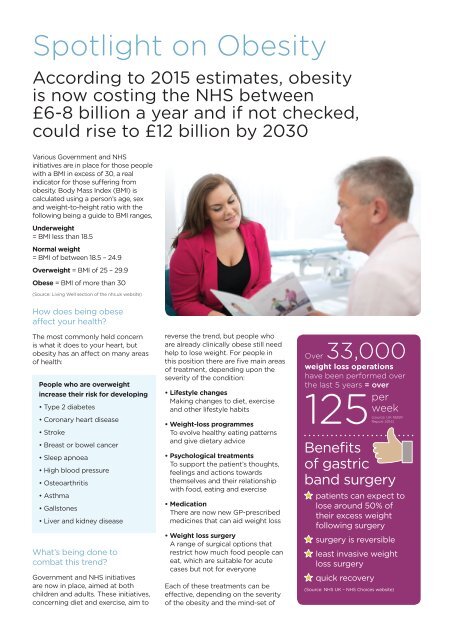Wealden Times | WT174 | August 2016 | Wedding supplement inside
Wealden Times - The lifestyle magazine for the Weald
Wealden Times - The lifestyle magazine for the Weald
You also want an ePaper? Increase the reach of your titles
YUMPU automatically turns print PDFs into web optimized ePapers that Google loves.
Spotlight on Obesity<br />
According to 2015 estimates, obesity<br />
is now costing the NHS between<br />
£6-8 billion a year and if not checked,<br />
could rise to £12 billion by 2030<br />
Various Government and NHS<br />
initiatives are in place for those people<br />
with a BMI in excess of 30, a real<br />
indicator for those suffering from<br />
obesity. Body Mass Index (BMI) is<br />
calculated using a person’s age, sex<br />
and weight-to-height ratio with the<br />
following being a guide to BMI ranges,<br />
Underweight<br />
= BMI less than 18.5<br />
Normal weight<br />
= BMI of between 18.5 – 24.9<br />
Overweight = BMI of 25 – 29.9<br />
Obese = BMI of more than 30<br />
(Source: Living Well section of the nhs.uk website)<br />
How does being obese<br />
affect your health?<br />
The most commonly held concern<br />
is what it does to your heart, but<br />
obesity has an affect on many areas<br />
of health:<br />
People who are overweight<br />
increase their risk for developing<br />
• Type 2 diabetes<br />
• Coronary heart disease<br />
• Stroke<br />
• Breast or bowel cancer<br />
• Sleep apnoea<br />
• High blood pressure<br />
• Osteoarthritis<br />
• Asthma<br />
• Gallstones<br />
• Liver and kidney disease<br />
What’s being done to<br />
combat this trend?<br />
Government and NHS initiatives<br />
are now in place, aimed at both<br />
children and adults. These initiatives,<br />
concerning diet and exercise, aim to<br />
reverse the trend, but people who<br />
are already clinically obese still need<br />
help to lose weight. For people in<br />
this position there are five main areas<br />
of treatment, depending upon the<br />
severity of the condition:<br />
• Lifestyle changes<br />
Making changes to diet, exercise<br />
and other lifestyle habits<br />
• Weight-loss programmes<br />
To evolve healthy eating patterns<br />
and give dietary advice<br />
• Psychological treatments<br />
To support the patient’s thoughts,<br />
feelings and actions towards<br />
themselves and their relationship<br />
with food, eating and exercise<br />
• Medication<br />
There are now new GP-prescribed<br />
medicines that can aid weight loss<br />
• Weight loss surgery<br />
A range of surgical options that<br />
restrict how much food people can<br />
eat, which are suitable for acute<br />
cases but not for everyone<br />
Each of these treatments can be<br />
effective, depending on the severity<br />
of the obesity and the mind-set of<br />
Benefits<br />
of gastric<br />
band surgery<br />
patients can expect to<br />
lose around 50% of<br />
their excess weight<br />
following surgery<br />
surgery is reversible<br />
least invasive weight<br />
loss surgery<br />
quick recovery<br />
(Source: NHS UK – NHS Choices website)


















